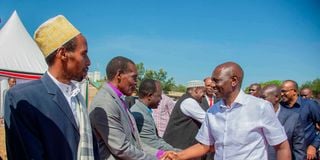Premium
A tough balancing act for Ruto in war against graft

President William Ruto (right) greets members of the clergy during an interdenominational prayer service at Isiolo Boys High School on May 21.
President William Ruto is facing a tough balancing act in his battle to eradicate grand corruption from his administration.
Talking tough while vowing to be ruthless in confronting corruption in the country, the President is facing his worst headache ever since assuming office eight months ago, a conundrum that threatens to split the nascent Kenya Kwanza government right down the middle.
Talking in Kandara, Murang’a County, on Friday last week, President Ruto declared that he will be ruthless in confronting corruption.
He vowed that no one found culpable of graft will be spared from his wrath, not even friends. Pledging “to talk less and act more going forward”, the Head of State promised to take personal responsibility in accounting for public resources.
“No one will steal or waste public resources. Whoever will try [to steal]public money will be dealt with accordingly. I have warned everybody including my friends about this,” declared the President.
However, with powerful individuals in the government behind the new multibillion-shilling scandals, Dr Ruto is caught in a catch-22 situation as he tries to navigate through the political minefield.
Restive base
Not wanting to upset his restive support base on the one hand, and having to reassure the country and the international community that the war on corruption is not just lip service; the Head of State could soon find himself in a make-or-break situation.
The first acid test that faced President Ruto was the Sh3.7 billion procurement of mosquito nets by the scandal-ridden Kenya Medical Supplies Authority (Kemsa).
Dr Ruto acted fast by cracking the whip at the State corporation, sending home Public Health and Professional Standards Principal Secretary (PS) Josephine Mburu in a purge that also saw Kemsa chief executive officer Terry Ramadhani and the agency’s board chairperson Daniel Rono sent home.
However, the firm and decisive action by the Commander-in-Chief sparked an uproar, with certain political players accusing the President of sacking a wrong PS and questioning why Medical Services PS Peter Tum was not fired.
The enraged faction cited Executive Order No 1 of 2023 on the organisation of the executive, where Kemsa is placed under the Department of Medical Services. Azimio la Umoja One Kenya Coalition Party leader Raila Odinga termed the dismissal of Dr Mburu a reactionary response to a significant problem within Kemsa.
“The government is merely reacting to a major issue at Kemsa. I believe this is not the only scandal reported in the authority. I anticipate that we will witness more revelations in this government,” he said.
What followed was a reshuffle in the government, with Mr Tum moved to the Youth Affairs, Arts and Sports docket as PS for Sports.
But all had not been well at the Health ministry, according to insiders, with the two PSs not on good terms as the fight over control of resources raged.
The bone of contention was a resolution putting Mr Tum as a signatory to all the ministry documents.
This did not sit well with Dr Mburu who, in a Senate Health Committee meeting held in Mombasa, claimed that she was “just a flower girl” at the ministry.
Considering that the public health docket controls all the donor funding for malaria, tuberculosis and HIV, there were complaints that led to the decision to split the programme.
Also Read: How lethal sugar vanished from warehouse
In the split, HIV funding was being handled by Mr Tum at the Medical Services department while malaria and tuberculosis remained under Dr Mburu.
With political coalescing in the country being mainly determined by ethnic considerations, the Kenya Kwanza Alliance is no exception.
The dominant communities in the alliance are President Ruto’s Kalenjin and his deputy Rigathi Gachagua’s Kikuyu.
The DP in February controversially declared that government appointments and contracts are a preserve of those who voted for the Kenya Kwanza government and there is no problem of having many Kikuyus in the government.
Appointing himself as the guardian of State House, Mr Gachagua said that he would be the one to determine who accessed the presidential residence and at what time.
Also Read: A look at the latest scandal involving Kemsa
Walking on egg shells and keen not to antagonise the vote-rich Mt Kenya region, President Ruto nominated former Kiambu County chief finance officer Faith Njeri as Dr Mburu’s replacement. The President powered to victory in the 2022 presidential election by garnering 7.1 million votes to secure the presidency in the first round.
The number was mainly buoyed by 17 counties from Mt Kenya and Rift Valley that contributed nearly two-thirds of the total vote.
The 10 Mt Kenya counties and the seven from the North Rift collectively handed Dr Ruto 4.5 million votes, translating to 63 percent of his total votes, considering that the voter turnout in the August 9 elections averaged 65.4 percent.
Poisonous sugar
Demonstrating the significance of the voting bloc; Laikipia, Tharaka-Nithi, Murang’a, Kiambu, Nyeri, Kirinyaga, Nyandarua, Embu, Meru and Nakuru collectively gave Dr Ruto nearly three million votes.
But even before the Kemsa dust had settled, a new scandal involving the release of poisonous sugar to the market had erupted, snaring a cabinet secretary and other influential individuals, all from the Mt Kenya region.
Already, the President has ordered investigations into the sugar scam to identify the faces behind the release of the condemned sweetener.
The Head of State could once again be faced with a delicate balancing act should the investigations not be interfered with and the powerful individuals suspected to be behind the scandal brought to book.
So far, the dirty sugar scam has claimed the jobs of former Kenya Bureau of Standards Managing Director Bernard Njiraini and the agency’s Director Quality Assurance and Inspection, Dr Geoffrey Muriira, among others.




